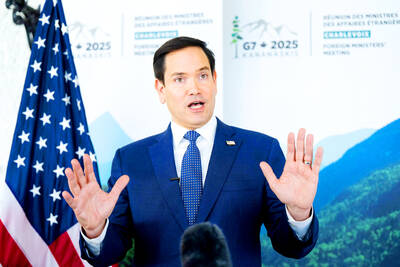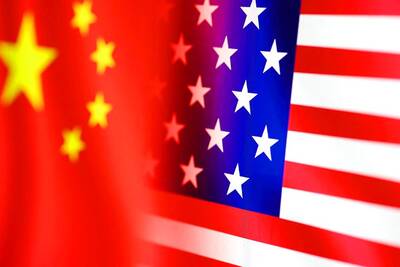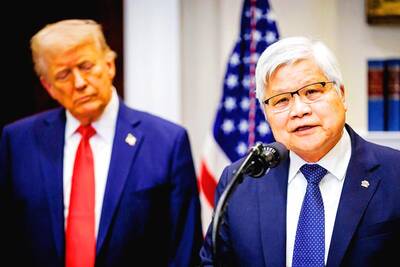President Chen Shui-bian's (陳水扁) remarks on Sunday about Taiwanese independence did not violate his "four noes and one without" pledge, nor were they targeted at former president Lee Teng-hui (李登輝), the Presidential Office said yesterday.
Chen caused a stir when he told attendants at the Formosan Association for Public Affairs' 25th anniversary dinner that "Taiwan will say yes to independence, Taiwan will be correctly named, Taiwan will have a new constitution, Taiwan will develop and there is no left-right political axis in Taiwan, just the question of independence or assimilation."
Sedition charges
Less than thrilled by his remarks, People First Party (PFP) lawmakers filed sedition charges with the Supreme Prosecutors' Office yesterday against Chen, saying they hoped Chen could be tried because he does not enjoy immunity from such charges.
Some said Chen's speech was a counter attack against Lee, who recently said that independence was not an issue because Taiwan is already independent.
Others argued that Chen's comments violated the "four noes and one without" pledge he made in his 2000 inauguration speech.
The "four noes and one without" pledge stipulated that as long as China does not intend to use military force against Taiwan, Chen will not declare independence, hold referendums on Taiwan's nationhood, seek changes to the national title, enshrine "state-to-state" relations with China in the Constitution, or abolish the National Unification Council and unification guidelines.
Damage control
Presidential Office Deputy Secretary-General Chen Chi-mai (
"The president said Taiwan will say `yes' to independence, but he did not declare independence. He said Taiwan will have a new constitution, but he did not say he will change the nation's title," Chen Chi-mai said.
Chen Chi-mai also dismissed talk that the president's remarks were in conflict with the Democratic Progressive Party's (DPP) platform, which declares that Taiwan as an independent, sovereign state.
"It is a fact that Taiwan is a sovereign nation independent from the People's Republic of China," he said.
Cho Jung-tai (卓榮泰), another deputy secretary-general of the Presidential Office, dismissed speculation that the president's remarks were intended to boost the DPP's chances in upcoming elections. He said the president had simply felt it was an appropriate time to point out that the nation's sovereignty was under constant threat from China and to spell out future policy goals.
"If the president's remarks were targeted at anyone, they were targeted at China," Cho said.
Cho said the US government had not commented on President Chen's speech, but repeated that the comments should not be controversial because they did not violate the "four noes and one without" pledge and were consistent with what the president had said before.
People First Party (PFP) and Chinese Nationalist Party (KMT) lawmakers, however, criticized the president for trying to spark a war with China.
"[The president] has committed the crime of sedition by making remarks at the risk of triggering a war. He should face the law for that," PFP caucus whip Fu Kun-chi (
PFP Spokesman Lee Hung-chun (李鴻鈞) said the party would boycott the national budget in the legislature if the president continued to push independence.
KMT lawmakers, meanwhile, said the president's comments were part of a strategy to win votes for the DPP in the legislative and presidential elections.
"[The president] hopes that military conflict [caused by his calls for independence] will divert public attention away from the DPP's poor performance and his embezzlement scandals," KMT Legislator Su Chi (蘇起) said.
"If China attacks Taiwan for seeking independence, Chen could then proclaim martial law and suspend the legislative and presidential elections," KMT caucus whip Hsu Shao-ping (
Saying that the KMT "firmly opposed the president's comments," acting KMT Chairman Wu Poh-hsiung (吳伯雄) said that "President Chen should explain to the public whether his `four noes and one without' promise is still in effect."
Former KMT chairman Ma Ying-jeou (
"The Republic of China is a sovereign, independent country and we have never doubted this," Ma said. "Why do we need to announce independence again?"
Ma added that President Chen often forgot what he had said, so the public should not take him seriously.
Taiwan Solidarity Union (TSU) Secretary-General Chien Cheng-shan (錢橙山) told a press conference yesterday that "everyone is very clear that Chen made the remarks to target former president Lee."
"The president's remarks were illogical because the DPP's Resolutions Regarding Taiwan's Future passed in 1999 stipulate that Taiwan is an independent state. We believe the public will pass their own judgment on his statements," Chien said.
Chien added that the TSU would not support any presidential hopeful who said that Taiwan should declare independence because the TSU believed that Taiwan had become an independent country after the nation's first direct presidential election in 1996.
DPP Chairman Yu Shyi-kun, however, said President Chen's remarks were in synch with the DPP's core values.
The Cabinet also supported the president.
"Taiwan is an independent country. In accordance with the Constitution, its name is the Republic of China [ROC]. The ROC and the People's Republic of China are two political entities that exist concurrently and are governed by two separate governments," Cabinet Spokesman Cheng Wen-tsang (
Former presidential adviser Koo Kwang-ming (

‘CROWN JEWEL’: Washington ‘can delay and deter’ Chinese President Xi Jinping’s plans for Taiwan, but it is ‘a very delicate situation there,’ the secretary of state said US President Donald Trump is opposed to any change to Taiwan’s “status quo” by force or extortion and would maintain that policy, US Secretary of State Marco Rubio told the Hugh Hewitt Show host on Wednesday. The US’ policy is to maintain Taiwan’s “status quo” and to oppose any changes in the situation by force or extortion, Rubio said. Hewitt asked Rubio about the significance of Trump earlier this month speaking with Taiwan Semiconductor Manufacturing Co (台積電) chairman C.C. Wei (魏哲家) at the White House, a meeting that Hewitt described as a “big deal.” Asked whether the meeting was an indication of the

PERMIT REVOKED: The influencer at a news conference said the National Immigration Agency was infringing on human rights and persecuting Chinese spouses Chinese influencer “Yaya in Taiwan” (亞亞在台灣) yesterday evening voluntarily left Taiwan, despite saying yesterday morning that she had “no intention” of leaving after her residence permit was revoked over her comments on Taiwan being “unified” with China by military force. The Ministry of the Interior yesterday had said that it could forcibly deport the influencer at midnight, but was considering taking a more flexible approach and beginning procedures this morning. The influencer, whose given name is Liu Zhenya (劉振亞), departed on a 8:45pm flight from Taipei International Airport (Songshan airport) to Fuzhou, China. Liu held a news conference at the airport at 7pm,

‘RELATIVELY STRONG LANGUAGE’: An expert said the state department has not softened its language on China and was ‘probably a little more Taiwan supportive’ China’s latest drills near Taiwan on Monday were “brazen and irresponsible threats,” a US Department of State spokesperson said on Tuesday, while reiterating Washington’s decades-long support of Taipei. “China cannot credibly claim to be a ‘force for stability in a turbulent world’ while issuing brazen and irresponsible threats toward Taiwan,” the unnamed spokesperson said in an e-mailed response to media queries. Washington’s enduring commitment to Taiwan will continue as it has for 45 years and the US “will continue to support Taiwan in the face of China’s military, economic, informational and diplomatic pressure campaign,” the e-mail said. “Alongside our international partners, we firmly

KAOHSIUNG CEREMONY: The contract chipmaker is planning to build 5 fabs in the southern city to gradually expand its 2-nanometer chip capacity Taiwan Semiconductor Manufacturing Co (TSMC, 台積電), the world’s biggest contract chipmaker, yesterday confirmed that it plans to hold a ceremony on March 31 to unveil a capacity expansion plan for its most advanced 2-nanometer chips in Kaohsiung, demonstrating its commitment to further investment at home. The ceremony is to be hosted by TSMC cochief operating officer Y.P. Chyn (秦永沛). It did not disclose whether Premier Cho Jung-tai (卓榮泰) and high-ranking government officials would attend the ceremony. More details are to be released next week, it said. The chipmaker’s latest move came after its announcement earlier this month of an additional US$100 billion